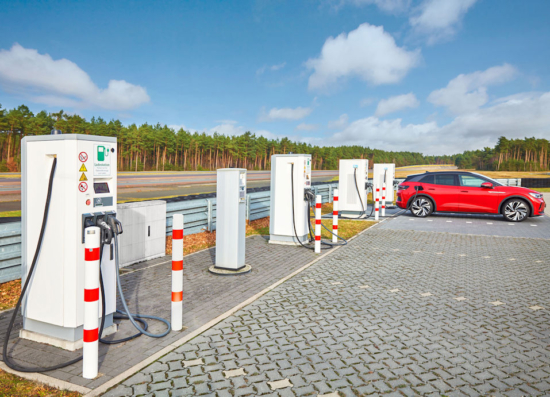No more range anxiety – Continental beefs up EV testing infrastructure
 A new transformer station at the Contidrom will supply enough energy for 8 additional twin rapid charging stations (Photo: Continental)
A new transformer station at the Contidrom will supply enough energy for 8 additional twin rapid charging stations (Photo: Continental)
Suitability for electric vehicles is a growing priority amongst tyre makers and something they’re incorporating into product development. To ensure its test fleet has sufficient juice to deliver all that’s asked of it, Continental is expanding electric vehicle charging infrastructure at its Contidrom proving ground in Germany as well as sites in Arvidsjaur, Sweden and Ulvade, USA.
Continental considers this investment a further step in the journey to “systematically align its in-house development and testing capacities towards electric transportation and its specific requirements.” The tyre maker and electronics firm describes the work carried out at the Jeversen-based Contidrom, located around 25 miles north of its global R&D headquarters in Hannover, as a “significant expansion” to the site’s charging infrastructure.
Tyres have gone through their paces at the Contidrom for around 55 years, and Continental performed the first electric vehicles tyre tests there more than a decade ago. The amount of EV testing has risen in line with the rise of electromobility over the years: “We supply nine of the world’s ten highest-volume manufacturers of electric vehicles with our tyres as original equipment,” comments Wolfgang Rötter, who heads the Contidrom proving ground.
Rötter observes that electromobility is “impossible” without charging stations, and Continental thus continuously upgrades its charging capacities to allow for even more electric vehicle testing. “This applies as much to electric cars as it does to electric trucks and electric buses.”
The extensive tyre tests that Continental performs sometimes require hours of uninterrupted driving on different sections of the track such as the wet or dry handling courses, so rapid recharging is vital. This year the Contidrom will gain a new transformer station that will supply enough energy for eight additional twin rapid charging stations – converted to kilowatts, this equates to a maximum available charging capacity of more than 2,000 kilowatts.
Advancing the transformation
For Continental, e-mobility is the key to a “more viable, climate-friendly form of transportation,” and it notes that “many vehicle manufacturers agree” with this viewpoint. “Many of our customers are working intensely to advance the transformation toward electric transportation. The next ten years will see them continue to shift the focus of their product portfolios toward battery-powered vehicles,” comments Meletis Xigakis, who is responsible for global tyre testing at Continental.
Xigakis believes it important to always ensure tyres are specially designed for the vehicle they’ll be fitted to. What’s more, he says the specific characteristics of electric vehicles impose specific technical requirements on their tyres. The high weight of the battery results in a heavier vehicle than their combustion-engine counterparts, and for this reason Continental designs tyres intended for electric vehicles to carry heavier loads. At the same time, the torque instantly available with electric drives is comparatively higher than with combustion engines, and when the car drives off its tyres need to transfer all this “instant torque” to the road within seconds.
Continental reports upgrading its “entire tyre portfolio” in line with the requirements of electric and hybrid vehicles to “achieve ever lower rolling resistance, low rolling noise and long service lives – with zero compromises on safety.” By the end of 2022, the company had implemented around 450 homologation projects for customers and their electric vehicles.




Comments